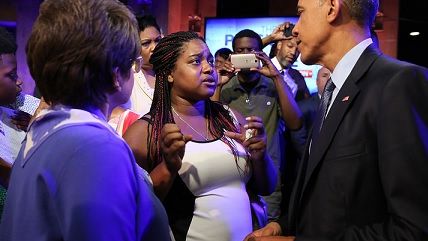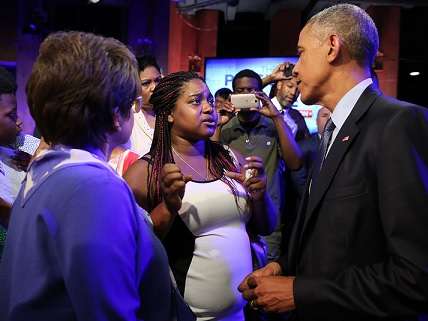Eric Garner's Daughter Blasts Clinton Campaign for Trying to Tie Police Violence to Gun Violence
Politicians would rather hew to their preferred talking points than engaging issues.


Hillary Clinton campaign staffers discussed shoehorning Eric Garner—killed by police who were trying to arrest him for allegedly selling loose, untaxed cigarettes—into a New York Daily News op-ed on gun control and separately that Garner deserved punishment but not death for his actions, the latest batch of John Podesta emails released by Wikileaks reveal.
In a series of tweets, Garner's daughter Erica said she'd be interested in knowing what staffer Corey Ciorciari meant when he said the campaign had an "Erica Garner problem" and what the campaign had to say about Podesta and Clinton previously saying they believed Garner deserved punishment, and why the campaign would discuss "using" her father.
Elsewhere on her Twitter timeline, Garner seems to know the answer. She points out Democrats feel entitled to black votes just because they're Democrats. She tweeted that people are told they "must vote" but can't vote third party or abstain because that's a trump vote. "so then u tell me then," she concluded.
Discussions within the Clinton campaign about using Garner to promote gun control should not be surprising, and neither should the silence from the Clinton campaign. As Erica Garner noted, Democrats feel entitled to black votes. The strategy to tie police violence to gun violence is also an old Democratic strategy, formed relatively quickly after police brutality entered the national discourse in 2014. Few Democratic politicians have been able to grapple with the problem of police brutality without falling on standard talking points on gun violence (or more government spending). At the Democratic National Convention, the party brought together mothers of victims of police violence and gun violence. The tactic is not far off conceptually from Republicans who try to rope in black-on-black violence to discussions of police brutality.
The problem of police brutality is primarily a problem of state-sponsored violence. For that reason, more than any others, comparisons to private violence, be it white-on-black, black-on-black, black-on-white, whatever, are unhelpful and irrelevant. Police officers and other law enforcement officials and armed government agents operate on behalf of and with the authority of the state behind them, placing them in practice in a separate class from other citizens in the criminal justice system. As if this were not enough, pro-union liberals and nominally anti-union conservatives have spent the last half century plus building a robust set of privileges for law enforcement officials.
So-called Law Enforcement Officers' Bill of Rights, pioneered in Maryland in the early 1970s, have now become universal, and are in addition to specific privileges police unions carve out for cops in collective bargaining agreements. Such agreements are not the product of any substantive bargaining—after all, the government and government workers are practically the same institution, democratic accoutrements notwithstanding. As Black Lives Matter's Campaign Zero highlights in its police union contract tracking project, privileges that have the effect of normalizing police violence and thwarting efforts at accountability or transparency exist in contracts all over the country, largely irrespective of the make-up of the particular government negotiating with the government.
The almost total lack of substantive engagement of the problem of police brutality on the national stage outside of cheap attempts to co-opt the issue for a pre-existing partisan agenda is a feature of the system of identity politics as electoral strategy, leaving as it does large swaths of the country unnecessary for either party to engage meaningfully, while each side does its best to offer the other fodder for the kind of fearmongering that can suppress the urge to look elsewhere for political solutions.


Show Comments (39)